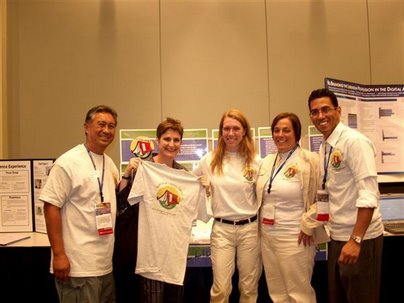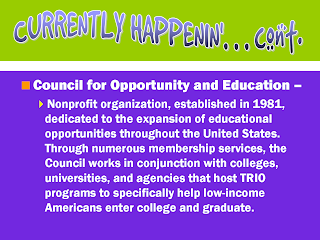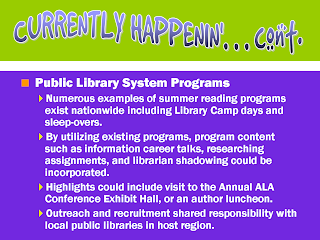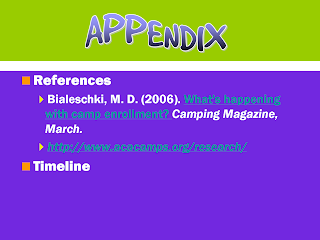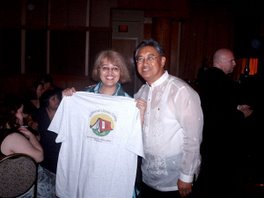Hi, all,
Good thinking, Kerry.
Right--finding out information about funding will be very helpful.
Perhaps one step will be to just itemize a few variables that you will try
to answer when you examine other camps available for young people. These
might include, for example:
1. Age level of participant
2. Number of participants
3. Day camp vs. boarding camp?
4. Location of camp: e.g., on campuses, hotels, recreation area
5. Length of time/duration of camp
6. Location (one location; multiple location)
7. Time of year/schedule slot
8. Focus (e.g., is there a theme, "leadership," etc.)
9. Academic claims: is credit awarded?
10. Other notes about curriculum
11. Funding: underwriting; tuition; fees, etc.
12. Products required: do attendees produce products
13. Notes about staff
Just a start!
Loriene
On Wed, 28 Feb 2007, Kerry Ward wrote:
> Hi Christy (and everyone!) - thanks for the message. I agree with
> Loriene, and I think your initial items for inclusion - description,
> demand analysis, conclusions/recommendations - are good. My one
> additional recommendation would be to include a small section on
> financial assumptions. For example, do other organizations (esp.
> nonprofits) offer career camps? If so, how do they finance them? Are
> there corporate sponsors, do participants pay a fee to help defray
> costs, etc. What are the major expenses - facilities rental, staffing,
> programming, travel, etc.? I definitely do not mean a line by line
> budget, but just an overview, i.e., "Based on research of similar
> programs, possible revenue sources for Library Camp would be a) b) c)
> and likely expenses would be a) b) c)." That's my thought but Loriene
> or others may have more to say. Please let me know if you need any
> other input, and thanks for your ongoing work! Kerry
>
> Kerry Ward
> Executive Director
> Association for Library Trustees and Advocates (ALTA), a division of
> the American Library Association (ALA)
> 50 E. Huron Street
> Chicago, IL 60611-2795
> Phone: 800-545-2433, ext. 2160
> Fax: 312-280-3256
> E-mail: kward@ala.org
> http://www.ala.org/alta
>
> >>> Loriene Roy 02/28/07 12:31 PM >>>
>
> Hi, Christy,
> I'll let Kerry weigh in as well.
> As a first step, you might outline the various elements that might
> appear
> in such a feasibility study. You've made an excellent start, below.
>
> You might:
> 1. Provide some narrative, introductory section (a couple of
> paragraphs).
> This could set the stage---the need, the interest, etc.
> 2. Then you could introduce questions: what do we need to know to
> prepare
> such a feasibility study?
> 3. You could see how close you might come to creating a full
> study--what
> can you address/answer? You might divide the content areas, start to
> pull
> the segments together, and see how the document emerges. The more
> details,
> the better, though I'm interested in any of your thoughts.
>
> Let's see what others say!
>
> Cheers,
>
> Loriene
>
>
> On Wed, 28 Feb 2007, Donaldson, Christy wrote:
>
> > Loriene and Kerry,
> >
> > We have some questions about the feasibility study for the National
> > Library Camp project we're doing. How in-depth do we need to get
> with
> > this study?
> >
> > Most feasibility studies include a description of the project with
> > various scenarios and benefits; a demand analysis/market assessment
> > which includes an industry description and competitiveness, market
> > potential and projections of attendance/interest;
> > technical/organizational feasibilities such as facilities/place,
> > technology needed, and business structure; financial/economic
> aspects
> > such has capital requirements, cost analysis, and return on
> investment;
> > and conclusions and recommendations.
> >
> > I definitely see us needing to put together the description aspect,
> the
> > demand analysis, and conclusions and recommendations. Do we need to
> go
> > as in-depth as to include the technical/organizational and
> > financial/economic aspects of the study?
> >
> > Thanks for clarifying!
> > =Christy
